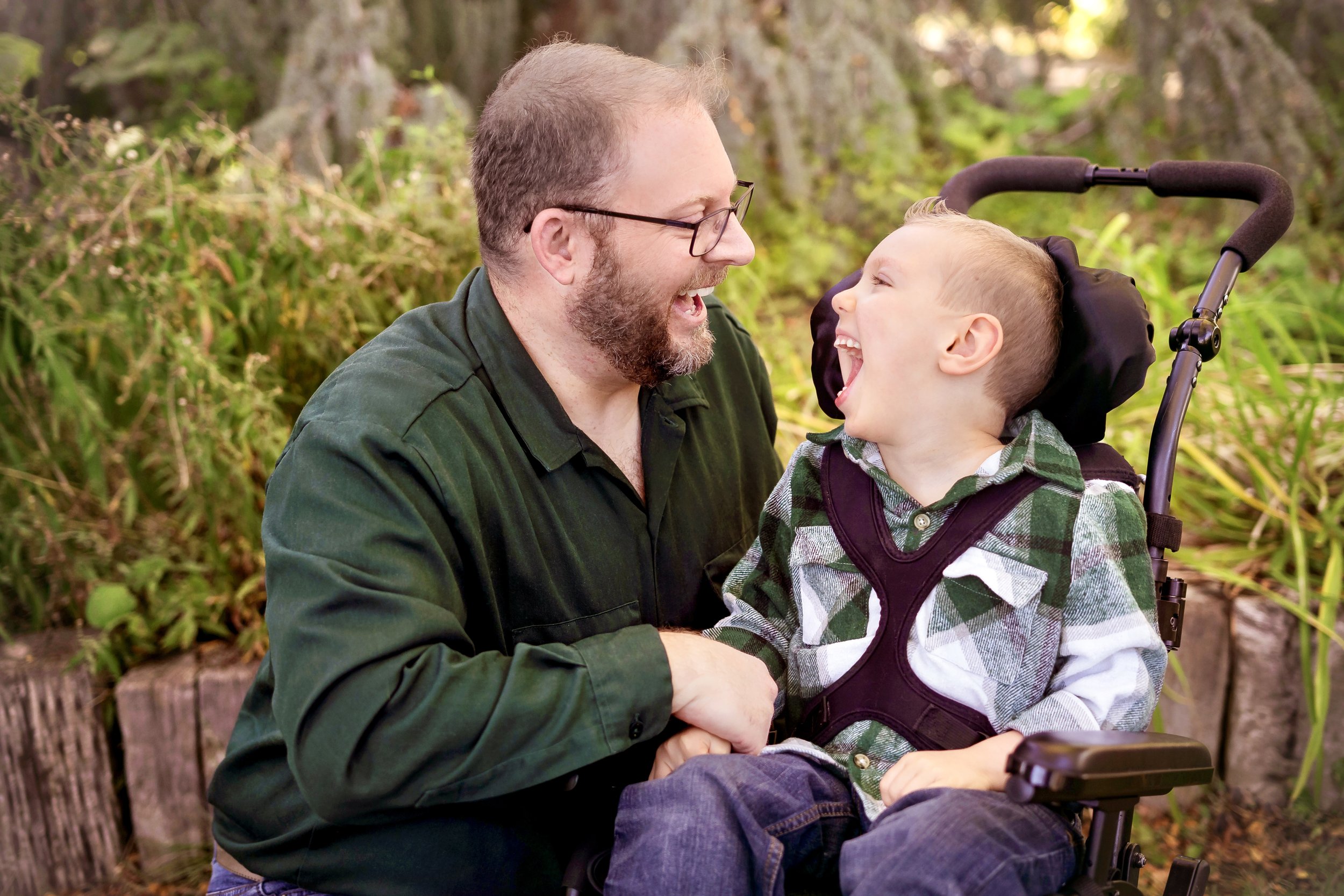Gould Syndrome is a rare, multi-system disorder caused by variants in the COL4A1 or COL4A2 genes. There are around 850 children and adults affected worldwide and counting. While any organ can be impacted, the most commonly affected areas include the brain, eyes, muscles, and kidneys.
Empowering Hope, Advancing Discovery
The Gould Syndrome Foundation is dedicated to empowering and improving the lives of affected individuals and their families through awareness, advocacy, education, and supporting research.
approximately 850
The number of people (infants, children, & adults) reportedly affected by COL4A1/COL4A2 genetic mutation, otherwise known as Gould Syndrome. Though this number rises daily as technology & genetic testing advances.
Medical Personnel
If you are a member of the medical community seeking more information regarding this condition, its varying symptoms, and further resources to assist your patient, click here.
external resources
Visit our External Resource page for both patients and providers. There you may access information on COL4A1/A2-related organizations and learn more about our recommended specialists and clinicians.
How can I support the gould syndrome Foundation?
Donations received support The Gould Syndrome Foundation’s mission to empower and improve the lives of affected individuals and their families through awareness, advocacy, education, and supporting research. We rely on our Scientific Advisory Board to help guide our decisions when funding research, and will review all applications for research funding using a system of peer review. Our Scientific Advisory Board is an international group of researchers and doctors expert in all aspects of Gould Syndrome who volunteer their skills to guide our foundation's decision making.
We are an accredited 501(c)(3) non-profit charitable organization. Your donation is tax deductible and makes a difference in learning more about this rare disease and possible treatments.
Exciting community news!
3rd annual col4a1-a2 international conference to be hosted by the gould syndrome foundation in boston, may 15-16, 2026!
We are pleased to announce that The Gould Syndrome Foundation, in partnership with Associazione Famiglie COL4A1-A2, will host the International Conference in the United States from May 15-16th, 2026—the first time this conference will be held in the US. This presents a valuable opportunity for our community to connect in person with families, researchers, and members of our Scientific and Medical Advisory Board.
These conferences are critical catalysts for rare disease research, creating platforms where stakeholders share knowledge, form partnerships, and accelerate scientific progress. For COL4A1-A2 disorders, such gatherings consolidate expertise and establish collaborations between institutions that drive funding and coordinated research efforts. More details to come regarding dates, travel information, and participation guidelines!
patient to patient recommendations
The Gould Syndrome Foundation is creating a patient-to-patient recommended clinician map to help families in our community find quality care regardless of where they are located. If you have experience with an excellent clinician who has directly treated you or your loved one with COL4A1/A2, we want to hear about them. Please share your top doctors and specialists through the link below. (Please note: These are community recommendations, not Foundation-approved referrals.) Thank you for helping our community!

Newly diagnosed? You are not alone. view our patients & caregivers resources here.
Faq’s about gould syndrome:
-
Our website is filled with resources available to you and your medical team. Clinical consensus and recommendations are ongoing and beginning to emerge.
-
You can direct them to the Medical Personnel page on our website here.
-
Gould Syndrome is diagnosed following a genetic test revealing a mutation in the COL4A1 or COL4A2 gene. If either parent carries the mutation, it is considered inherited. If neither parent carries the mutation, it is considered de novo which means that the mutation is a new occurrence. Approximately two-thirds of cases are de novo while one-third are inherited.
In cases where the mutation is inherited, the carrier parent is often mildly affected or unaffected. This can occur if the carrier parent is a mosaic – which means that some cells carry the mutation while other cells do not. The degree of mosaicism is highly variable – ranging from only a small percent of cells with the mutation to nearly all cells carrying the mutation – and depends on the stage during development that the mutation occurred. It is important to discuss these concepts with a genetic counselor and understand their implications.
-
While there are currently no cures or treatments available, Dr. Gould’s lab at the University of CA is exploring therapeutic avenues using gene-editing technology, which may potentially help individuals affected with COL4A1/A2 mutations in the future. Working with your team of medical specialists can help optimize your health as you navigate the challenges associated with this rare disease. To help advance understanding and integrate different medical subspecialties, the UCSF Benioff Children’s Hospital has recently launched a Gould Syndrome Center of Excellence.
-
Yes, there are 2 active research studies currently enrolling patients. Learn more about each of them, and inquire here.
-
Collagen type IV alpha 1 (COL4A1) and 2 (COL4A2) are extracellular matrix proteins that together constitute a major component of nearly all basement membranes which are specialized sheets of proteins found in every organ. The two genes that code for these proteins are tightly linked on chromosome 13. Dominant COL4A1 and COL4A2 gene variants cause a highly variable, multisystem disorder. It is recommended you work directly with your genetic counselor to help understand your specific gene variant and the effects it may cause.
-
There are currently over 850 cases reported. Although they are concentrated in countries with health care systems where genetic testing is readily available, affected individuals are expected to be found uniformly all over the world.
-
Signs and symptoms of Gould Syndrome can manifest at almost any age from before birth to old age. The current impression is that Gould Syndrome is more likely to be a childhood or developmental disease. However, this is likely in part to ascertainment bias whereby younger or more severely affected individuals are more likely to have genetic testing performed. As more knowledge is gained, it is likely that older and more mildly affected individuals will continue to be identified. Some individuals do not have any observable symptoms (asymptomatic); others can develop severe, even life-threatening complications. Some may only develop specific symptoms such as isolated migraines or strokes in childhood or adulthood. The variability and severity of symptoms are significant.
-
West Coast: The University of California in San Francisco Gould Syndrome Center is a service of the Pediatric Neurology Program and is the world's first center dedicated to supporting patients diagnosed with Gould Syndrome. Learn more about the UCSF Gould Syndrome Center here.
East Coast: If you are on the East Coast, Mass General Brigham (MGB) in Boston offers both specialized clinical care and dedicated research for individuals and families affected by COL4A1/2 conditions. Their multidisciplinary team of providers delivers comprehensive, specialized care, while their research program focuses specifically on advancing understanding of COL4A1/2-related disorders. Learn more about their specialized care here.
-
Yes. Mutations in COL4A1, and subsequently COL4A2, were first discovered in 2003 by Dr. Douglas Gould. Dr. Gould earned a PhD in Medical Genetics at the University of Alberta in Edmonton, Canada and is now a Professor in the Departments of Ophthalmology and Anatomy at University of California, San Francisco. In 2005-2006, Dr. Gould published manuscripts in Science and The New England Journal of Medicine reporting the discovery of COL4A1 mutations in individuals with porencephaly and small vessel disease. He has dedicated his career to defining and understanding the multi-system disorder caused by COL4A1 and COL4A2 mutations with the help of his team of researchers.
-
The most common specialists associated with Gould Syndrome are neurology, ophthalmology, physical therapy, occupational therapy, genetics, speech therapy, orthopedics, nephrology, cardiology, and gastroenterology.
-
Yes! Gould Syndrome Awareness Day is April 12. This date was chosen due to April being the 4th month of the year and the 12th including the numbers 1 and 2 which refer to COL4A1 and COL4A2.
fit for a warrior
Support our mission and spread awareness with exclusive Foundation merch!
join the gould syndrome community
The true number of people diagnosed with Gould Syndrome rises daily as genetic testing, technology & scientific findings progress. Sign up for our newsletter to be notified when the Patient Registry is live. There you will be able to add your information and help advance studies related to this rare genetic mutation.
Photo c/o Tami H., Gould Syndrome community member






















